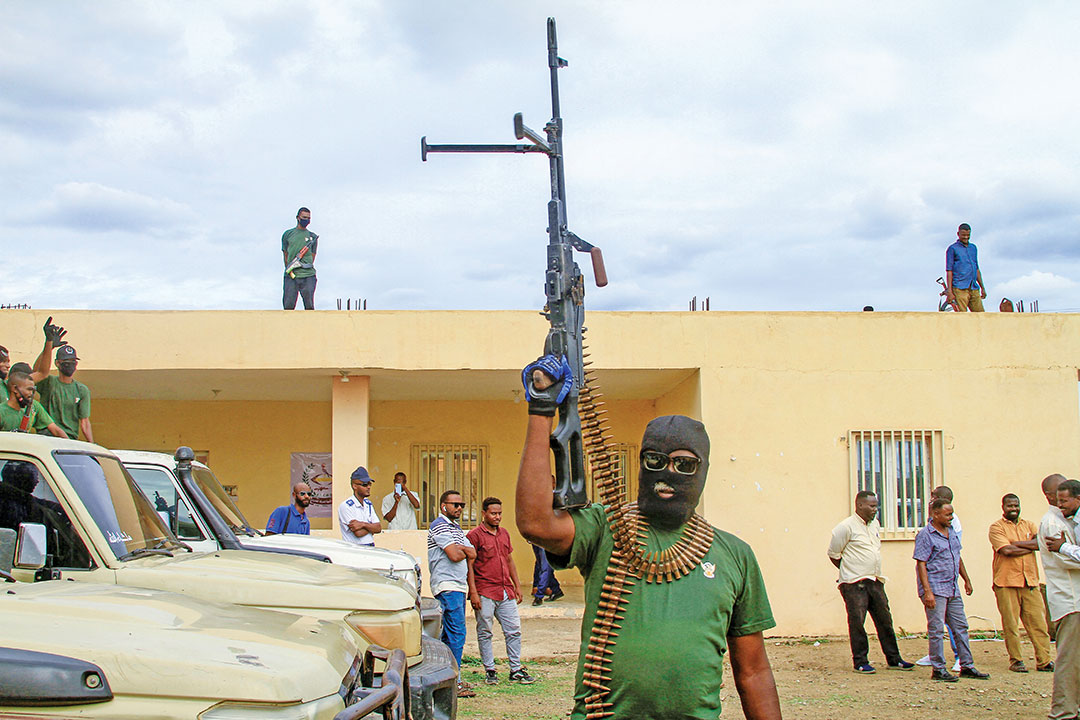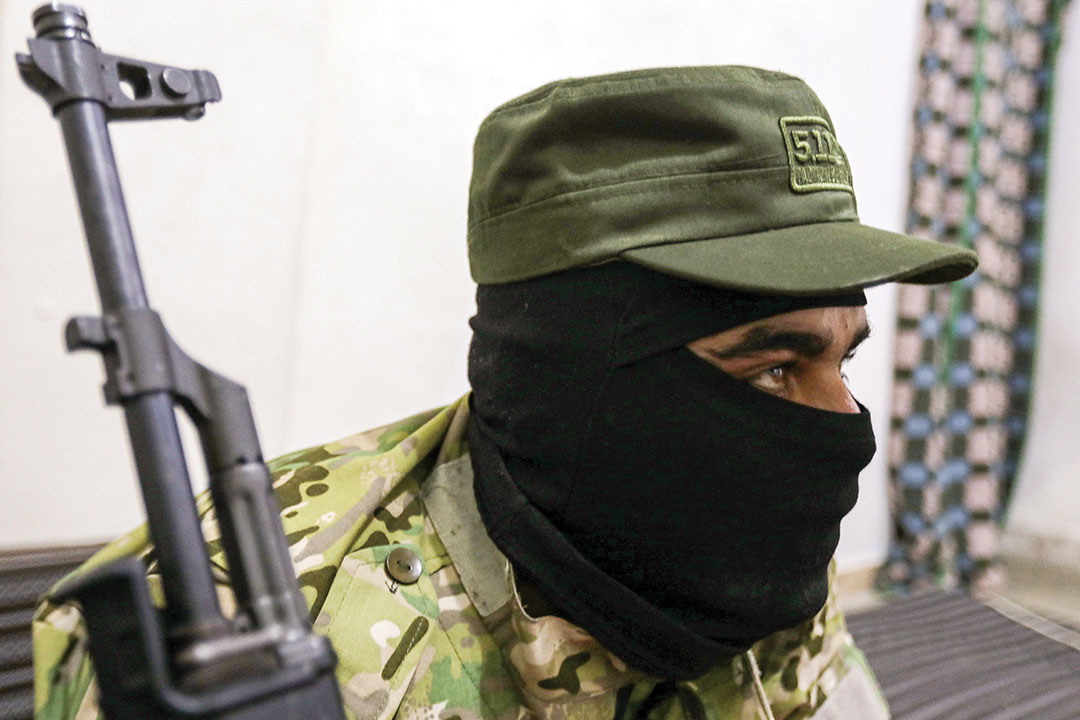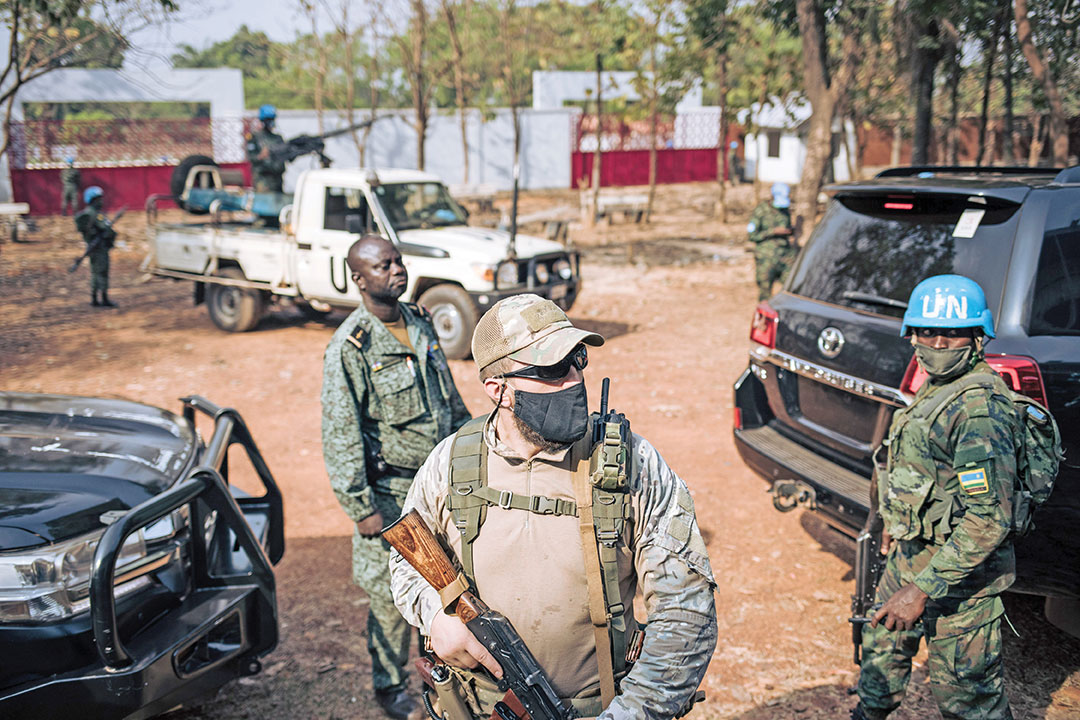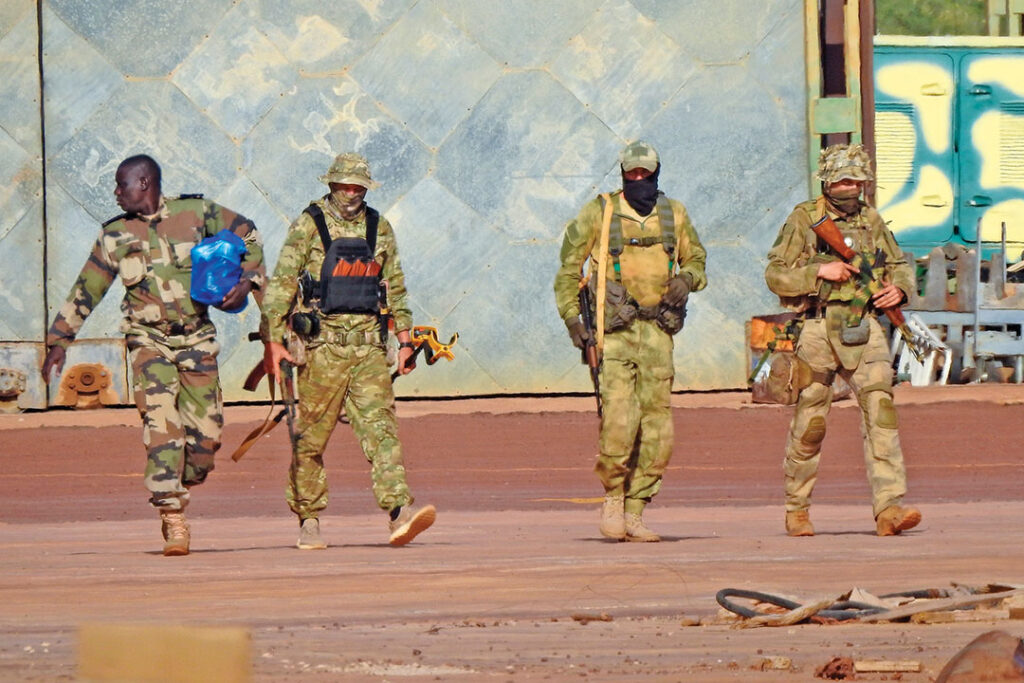Private military companies, private security companies, paramilitary forces and mercenaries have operated in Africa for decades, but their use by African nations has spiked in recent years, causing concern among the continent’s security experts.
The numbers are staggering. At the height of the conflict in Libya, there were an estimated 20,000 foreign fighters supporting both warring factions. Russia’s Wagner Group alone deployed an estimated 5,000 to 7,000 mercenary forces to countries including the Central African Republic, Libya, Mali and Sudan with plans to grow its force size on the continent to 20,000.
“We are witnessing the ever-increasing presence of mercenaries and mercenary-related actors in contemporary armed conflicts and the ever-mounting risk of grave human rights abuses and war crimes,” said Sorcha MacLeod, chair of the United Nations working group on the use of mercenaries.
When discussing these fighters, definitions are important. Private military companies (PMCs), sometimes called private military security companies (PMSCs), are legal entities. Their use is controversial and often raises questions about accountability and actual or potential abuses. Private security companies (PSCs) provide armed or unarmed security services. Paramilitary groups often are politically motivated, might not be focused on profit and sometimes act as national military auxiliaries. Mercenaries are individuals who sell their services to fighting forces or causes as freelancers.

AFP/GETTY IMAGES
Transactional Security, at a Price
The modern face of the foreign mercenary operating in Africa is that of Russia’s notorious Wagner Group, rebranded Africa Corps after the 2023 death of its founder, Yevgeny Prigozhin. Now an official Russian government entity, the Wagner Group trades security services for precious metals and gem deals in some of Africa’s most dangerous countries. As a result of their operations over the past five years, the Wagner Group now maintains an opaque, complex network of operations on the continent that critics say plunders diamonds, gold and other natural resources. They also exercise outsized influence over the government and security forces in areas where they operate, according to The Sentry, an investigative policy organization. Due to the attrition of its own security forces in Ukraine, Russia has resorted to hiring Syrian mercenaries to fill security contracts in the CAR, Libya and other countries.
An overwhelming number of well-publicized atrocities follow Wagner Group deployments, highlighting the dangers of employing foreign forces with little to no training or experience with insurgency warfare. Several reports document Russian mercenary forces ordering government forces to kill women and children, torture people, and conduct ethnic cleansing campaigns against communities. Fighters involved in these activities told The Sentry that the mercenaries’ intention is to create terror and instill fear. This shock and awe approach is anathema to prevailing counterinsurgency doctrine, which emphasizes winning the hearts and minds of the population.
“Preying on instability and weak states, the Wagner Group has instrumentalized violence in an unchecked pursuit of economic resources and political power, with horrific consequences for civilian populations,” Charles Cater, director of investigations at The Sentry, said in a news release. “Nowhere has this threat been more evident than in the Central African Republic, whose increasingly compromised sovereignty should serve as a stark warning to other governments in Africa and elsewhere.”
Russian mercenaries also are being used to provide regime protection for military juntas that seized power in Burkina Faso, Mali and Niger. Although these junta leaders invited the Russian mercenaries under counterterrorism pretenses, terrorist group violence has continued to expand, with the number of Sahelian deaths nearly tripling to more than 11,600 since 2020. This indicates that either the counterterrorism auspices of the Wagner Group deployment were a ruse, or its personnel are ineffective as a counterterrorism force.
“We have seen it across the Sahel and beyond, resulting in bloody [coups], attempted removal of leadership, illegal mining extraction as well as severe and explicit human rights abuses, including sexual violence against women and girls,” analyst Jonathon James wrote in the Nigerian newspaper This Day Live. “Russia’s very presence on the continent is an overt threat to peace, security, democracy and sovereignty.”
One incident highlighted the failure of undertrained mercenary forces. In July 2024, 47 Malian Soldiers and 84 Russian mercenaries were killed at Tinzaouaten by Jama’at Nusrat al-Islam wal-Muslimin (JNIM) and allied Tuareg rebel fighters. This was the biggest loss of mercenary forces on the continent, and the biggest military disaster in Mali’s long-standing fight against Tuareg separatists and Islamist militants in the Sahel.
Russia’s mercenary model in Africa is a cautionary tale of trading a country’s sovereignty, precious resources and future economic viability for short-term security gains that can’t be sustained with an untrained and inexperienced foreign force.
The mercenaries’ failures and abuses of civilians have left some more fearful of foreign soldiers hired by their government than of terror groups.
“They have shifted the balance of fear: Civilian populations are now more scared of being arrested or killed by Wagner than jihadist and other armed groups,” Héni Nsaibia, a senior analyst with the Armed Conflict Location & Event Data project, told The New York Times. “But they haven’t affected the jihadists groups’ capacity to operate.”

Focused on Protecting Chinese BRI Investments
Chinese PSCs also have rapidly grown in Africa in recent years, but in contrast to the Wagner Group model, Chinese PSCs focus on protecting the country’s Belt and Road Initiative (BRI) investment projects. With a predominant presence in Sub-Saharan Africa, Chinese PSCs are employed to protect state-owned Chinese company projects and personnel that produce more than $50 billion in revenue each year, according to the Africa Center for Strategic Studies (ACSS).
Through the BRI, Beijing has placed tens of thousands of Chinese national workers in Africa to build Chinese-financed infrastructure projects. A few years ago, China turned to PSCs to protect assets such as mines, natural gas projects, railways and shipping routes.
“We have seen a massive deployment of workers, Chinese workers, more specifically,” Jasmine Opperman, an independent security consultant based in South Africa, told Voice of America (VOA). “Now these investments, like in Sudan, South Sudan, are really in volatile areas, so we have seen a proliferation of Chinese [PSCs] on the African continent, with a task to protect employees and the infrastructure projects.”
In July 2024, militia fighters killed nine Chinese nationals at a Chinese-linked mining site in the northeastern Democratic Republic of the Congo’s (DRC) Ituri province. Analysts say incidents like this — and a 2023 attack that killed nine Chinese nationals at a gold mining site in the CAR — resulted in the deployment of more Chinese security companies.
“It’s about the protection and expansion of Chinese influence, and because of the volatile security situations, we are seeing these [PSCs] now growing in numbers,” Opperman said.
Beijing’s PSCs operate differently than Moscow’s mercenaries. Most Chinese security contractors are strictly controlled and don’t carry weapons, except for those involved in counterpiracy maritime
escort missions.
“Wagner is engaged in combat operations,” Paul Nantulya, a China expert at the ACSS, told VOA. “It’s engaged in wars; it supplies a national security adviser in, for instance, the Central African Republic. They become part of the governing architecture. They fight wars on behalf of governments.”
Chinese contractors typically conduct military trainings with host nations and supply equipment, intelligence and surveillance. Opperman said the Chinese security contractors still could have a destabilizing effect.
“Though PMCs from China are not allowed to carry weapons, what they are doing is collaborating through private or local security companies or even local militia groups in terms of providing security,” she said. “By means of collaborating with local militias, you’re basically taking sides.”
UAE a ‘Hub for Mercenary Activity’
Since the 2010s, the United Arab Emirates (UAE), known to be a central logistics and financing hub for Russian mercenaries, has strengthened military ties with many African countries, particularly in the Horn of Africa and the Sahel. Abu Dhabi seeks to gain influence, access mineral resources, and protect trade routes in the Red Sea and the Gulf of Aden.
Mercenaries hired by the UAE work to combat terrorism, insurgency and piracy; provide weapons and equipment; promote defense cooperation; and offer military support to nonstate armed actors in Ethiopia, Libya and Sudan. In Sudan, the UAE is accused of arming the paramilitary Rapid Support Forces (RSF) during its war with the Sudanese Armed Forces (SAF).
Since 2016, the UAE has signed military agreements with Chad, Ethiopia, Kenya, Mali, Mauritania, Mozambique, Somalia’s autonomous Puntland State, Senegal and Somalia. Abu Dhabi since the 2010s also has established military outposts in Chad, Egypt, Eritrea, Libya, Puntland, semiautonomous Somaliland and Somalia.
The UAE also hires foreign fighters to protect its interests on the continent. Abu Dhabi hires Colombian mercenaries, for example, to support the RSF in Sudan. About 160 Colombian fighters were part of a caravan traveling from Libya into Sudan in mid-November 2024 when they were attacked by a group aligned with the SAF. Three mercenaries were killed.
Reports emerged in 2024 about a job advertisement circulated by Abu Dhabi-based Manar Military Co. seeking a “Foreign Legion operator.” The ad sought a person under 50, highly disciplined, physically fit with more than five years of military experience and able to handle “high stress conditions.” Pay started at about $2,000 monthly but would increase once the person was deployed to Somalia or Yemen.
“Certainly when you hear ‘mercenaries’ nowadays, I usually think UAE much more than Russia,” Andreas Krieg, a senior lecturer at the School of Security Studies at King’s College in London, told German news service Deutsche Welle. “The Emirates have become something of a hub for mercenary activity in the global South.”
Turkish Fighters in the Sahel, West Africa
Turkish PMCs also have entered the African market, and they are known to employ Syrians to fight alongside their PMCs in the Sahel and West Africa. In 2024, Ankara’s Sadat International Defense Consultancy, a PMC closely allied with President Recep Tayyip Erdoğan, sent 1,100 fighters recruited from Syrian refugee camps to Niger.
“In Niger, Syrian mercenaries are supposed to guard mines, oil installations or military bases,” Rami Abdel-Rahman, director of the London-based Syrian Observatory for Human Rights, told French newspaper Le Monde. “But they then find themselves involved in fighting against jihadist groups.”
Turkish contractors also have been reported in Togo, where they have flown attack helicopters. Two reportedly were killed in combat with JNIM.
“Turkey also has opportunities to increase economic and military cooperation with Burkina Faso and Mali, but Russia’s larger presence in both countries will pose a greater obstacle,” analyst Liam Karr wrote for the Institute for the Study of War.
Turkish PMCs are involved in more traditional roles of providing economic infrastructure security and force training services. Although Turkish PMCs have competed for many of the same contracts as Russian and UAE companies and employ similar recruiting tactics, they’re generally viewed as a more palatable and disciplined option with minimal risk of operational brutality and human rights abuses.

Mercenary Forces do Not Ensure Long-Term Stability
Proponents of hiring mercenaries cite their value in maintaining peacekeeping efforts and offering humanitarian assistance, often in conflict zones and areas where government forces are unwilling or unable to act.
However, analysts fear mercenaries are not held accountable for atrocities committed against civilians in conflict zones and that there is a risk of confusion and unintended consequences when other military forces are active in the same theater. Some observers also find troubling the use of natural resource concessions to pay for mercenary and other security services, as in the CAR and Mali.
“In effect, these governments are mortgaging their country’s economic future to foreign groups that, ironically, thrive on instability as a source of demand for their services,” Alan Doss, former under-secretary general of the U.N., wrote in African Arguments.
Mercenaries also might not be invested in ensuring the long-term stability of the nations that hire them. In January 2025, nearly 300 Romanian mercenaries recruited to help the DRC’s Army battle M23 rebels withdrew to Rwanda and eventually went home.
In a BBC report, one of the Romanian mercenaries said M23, which claims to fight to protect the rights of ethnic Tutsis, was supported by state-of-the-art military equipment and that the DRC’s Army gave up. “Missions were disorganized, working conditions poor,” said another. “Romanians should stop going there because it’s dangerous.”
Some analysts say training indigenous military forces to battle homegrown insurgencies is more effective than hiring foreign fighters. In Somalia’s Puntland region, security forces in January 2025 destroyed several operating bases for the Islamic State group (IS) in the Cal Miskaad Mountains. The attacks were part of a broader strategy by Puntland authorities to enlist the region’s ethnic clans in the fight against IS.
“The fight cannot be won by security forces alone,” Puntland’s First Deputy Speaker Mohamed Bari Shire said. “We need the courage and cooperation of the people to secure our communities.”
In viewing the security landscape in Africa, most of the continent’s security experts agree that the use of mercenaries or PSCs does not lead to long-term peace.
“African and other governments should recognize that mercenaries are not the answer to state weaknesses,” Doss wrote for African Arguments. “Quite the opposite: they are antithetical to state building because they do not contribute in a sustainable manner to enhancing state capacity. Governments that rely on mercenaries or PMSCs … to shore up their national security are likely to remain vulnerable to instability.”
Experts Work to Regulate a Growing Threat
ADF STAFF
More than 150 experts and stakeholders from across Africa met in September 2023 to discuss the ramifications of the growing number of foreign fighters on the continent. There was a consensus that the African Union must reassess its stance on mercenaries and take action to guard civilians.
The two-day symposium was hosted by the Secretariat of the AU’s Economic, Social and Cultural Council in Zambia; the University of Johannesburg’s Institute for Pan-African Thought and Conversation (IPATC); the Institute for Peace and Security Studies at Addis Ababa University; and the Pan-Africana Strategic and Policy Research Group in Nigeria.
During the meeting, speakers urged African states to prioritize security sector reform and ensure that foreign fighters who commit atrocities are subjected to the rule of law. The experts and stakeholders agreed that mechanisms for targeted sanctions on governments or organizations using foreign fighters and mercenaries must be implemented.
Adeoye Akinola, head of research and teaching at IPATC, and Ratidzo Makombe, a researcher there, documented several AU policy recommendations that emerged from the two-day symposium, including:
Review legal frameworks such as the 1977 Convention on Mercenaries, strengthen partnerships between the AU and regional economic communities, and improve political and security institutions through bilateral and multilateral platforms, real-time data exchange and interconnected databases.
Facilitate the formulation and implementation of inclusive socioeconomic development programs to empower citizens and stem the proliferation of insurgency groups and military coups.
Design a disarmament, demobilization and reintegration program to disengage local and foreign fighters from conflict and integrate them back into the society.

